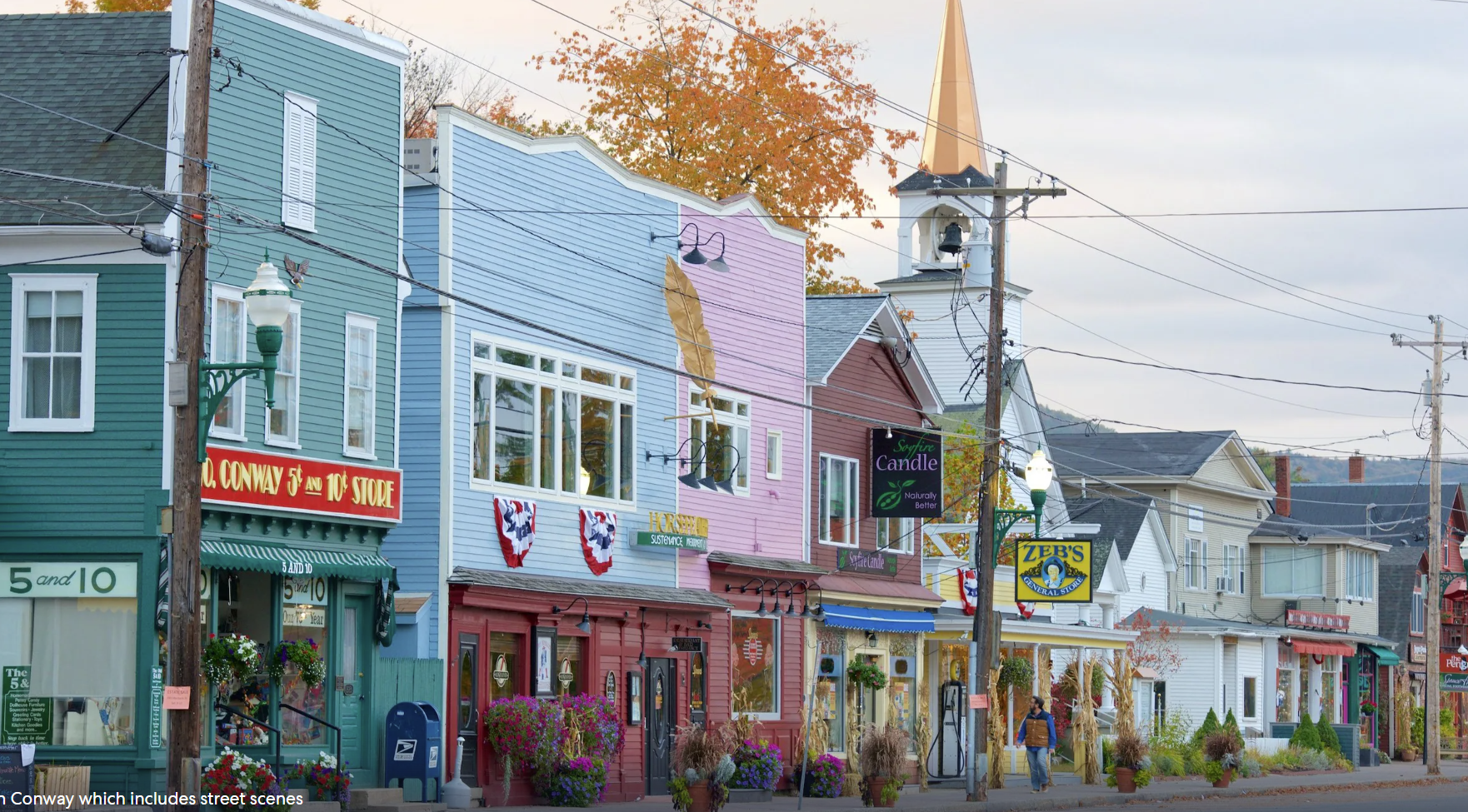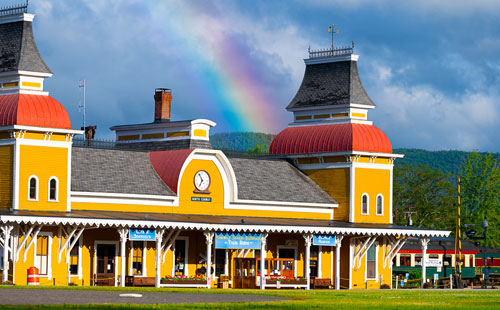Series 1: Zoning Concepts & Process
Information about key concepts in zoning, the zoning process, and the relationship between zoning and the Master Plan
 Town of Conway Complete Zoning Ordinance Review & Update
Town of Conway Complete Zoning Ordinance Review & Update
Image 1 of 3



Zoning is a regulatory tool that determines allowed land uses for different areas in a community. Zoning can restrict certain types of development and can encourage other kinds of development. Conway’s current zoning does not align with the community’s vision for the future – for example, current zoning for Conway’s villages encourages large, big box style development with large parking areas in locations where it is not desired by residents. Conway’s quaint, walkable villages could not be rebuilt in their current form according to the Town’s zoning rules. Likewise, Conway’s current zoning could provide stronger support for the development of needed housing (including affordable housing) and the preservation of agricultural lands, among other opportunities.
The Town of Conway has partnered with Barrett Planning
Group, LLC and SE Group to involve residents, staff, and the Conway Planning
Board with a zoning update. The Conway Master Plan, released in 2024,
identified updating Conway’s zoning map and land use regulations as one of two
major “catalyst projects” to achieve the Master Plan Vision.
The process to update the Zoning Ordinance for the Town of Conway requires extensive and iterative involvement from community members. While data and a variety of government and institutional resources play an important part in a zoning rewrite, community members’ knowledge about the town’s neighborhoods and lived experience play a fundamental role in assessing land use and zoning. The scope of this Engagement Plan includes both Phase I and II of the intended rezoning in the Town’s bylaw.
The future land use map released in the Master Plan will inform the changes made to the Zoning Ordinance to align future visioning and regulatory action. The Master Plan is not a binding, legal document; however, a Master Plan is required for a community to adopt any zoning ordinance, subdivisions, or site plan review regulations in New Hampshire.
Timeline item 1 - active
Start Up and Initial Meetings
Meet with Town staff and stakeholders about the existing implementation of the zoning ordinance.
Timeline item 2 - incomplete
Zoning Diagnostic
Zoning Audit to identify strengths and weaknesses of the existing ordinance.
Timeline item 3 - incomplete
Preliminary Draft of the Zoning Ordinance
Timeline item 4 - incomplete
Draft of Revised Ordinance
Timeline item 5 - incomplete
Public Review of the Revised Ordinance
Timeline item 6 - incomplete
Adoption of Revised Ordinance and Zoning Map
Information about key concepts in zoning, the zoning process, and the relationship between zoning and the Master Plan
Themes from conversations with community members about desired land use and zoning changes.
A summary of recommended zoning amendments.
In 2024, the Planning Board adopted a new Master Plan, Conway Forward. The Master Plan includes many land use recommendations to guide future development. Implementing those recommendations will require Conway to update the Zoning Ordinance
Zoning is the legal process for regulating the use of land and the size, location, and use of buildings and structures within a community.
Currently, Conway has eleven zoning districts which are meant to guide land use within specific areas. These districts outline where commercial, residential, and industrial type land uses are focused.
State law provides for the following purposes:
To lessen congestion in the streets;
To secure safety from fires, panic and other dangers;
To promote health and the general welfare;
To provide adequate light and air;
To prevent the overcrowding of land;
To avoid undue concentration of population;
To facilitate the adequate provision of transportation, solid waste facilities, water, sewerage, schools, parks, child day care;
To assure proper use of natural resources and other public requirements;
To encourage the preservation of agricultural lands and buildings and agricultural operations;
To encourage the installation and use of solar, wind, or other renewable energy systems and protect access to energy sources …
Zoning was first adopted in March of 1980.
Yes, Conway also has Subdivision Regulations and Site Plan Regulations, both of which are adopted by the Planning Board. However, these regulations do not determine land use. They are tools for reviewing and permitting developments that are consistent with and authorized by the Zoning Ordinance.
A Master Plan is the legal decision-making process for a community to set goals for future uses of land. It recommends policies for land use, economic development, housing, transportation, and many other local needs, but on its own, a Master Plan does not create regulatory powers. A zoning ordinance is the tool that implements a Master Plan’s land use policies.
Over approximately 18 months between 2025-2027, the Planning Board will help to guide the process for incorporating the Master Plan’s key land use recommendations into a new, proposed Zoning Ordinance. This effort will include ongoing opportunities for public input to ensure the revised Ordinance accurately reflects the communities intentions. Ultimately, Conway voters will decide at Town Meeting whether to adopt the proposed ordinance.
The Planning Board will host public meetings to keep the community updated about the process and seek input from residents and businesses about potential changes to the ordinance and the Zoning Map. In addition, this project website has been created to post information about the zoning revision as it moves forward. The project website will also feature occasional surveys or polls and provide other “interactive” opportunities for residents to provide input between public meetings.
This site is owned and operated by Barrett Planning Group using software licensed from Social Pinpoint. We take appropriate measures to safeguard personal information and use encryption, access controls, and other security measures to protect it. For details on what personal information we may collect and access, please refer to Social Pinpoint's Privacy Policy.
Users have the right to access, correct, or delete their personal information, subject to certain exceptions. For details on how to exercise these rights, or for any questions or concerns about our privacy practices, please contact us in writing at BPG@BarrettPlanningLLC.com.
This privacy policy may change from time to time, and any changes will be communicated to users through the site.
The following Terms and Conditions govern the use of Engage with Barrett Planning Group (“the site”). The software platform is owned by Social Pinpoint Pty Ltd and operated by us, Barrett Planning Group.
By accessing and using this site, you are choosing to accept and comply with the Terms presented throughout this agreement as well as the Privacy Policy and Moderation Policy. These Terms apply to all visitors and users of this site. Linked sites, affiliated services or third party content or software have their own Terms that you must comply with. If you disagree with any of the Terms presented in this agreement, you may discontinue using the site immediately.
If you are under 18 years old, please ensure that your parent or guardian understands and accepts these Terms and Conditions (including the Privacy Policy and Moderation Policy).
What are the conditions with a user’s account?
While using the site, you must not violate any applicable laws and regulations. It is our duty to protect the confidentiality of content you provide on our site in accordance with our Privacy Policy. When you create an account with us, you must always provide us with accurate information. Failure to provide accurate information violates the Terms, which may result in immediate termination of your account on our service. You are responsible for protecting your own password you use for this site and for any activities done under that password. Unauthorised use of your password or account must be immediately reported to us. In some cases, we or our agents may require access to your user accounts to respond to technical issues.
We are not responsible for the content on the site that has been provided by the users of the site. Any content posted by you is subject to the rules of our Moderation Policy. Your contribution to the site may be edited, removed or not published if we consider it inappropriate (refer to Moderation Policy). Contributors should also be aware that their posts may remain online indefinitely. Where practical, you may choose not to identify yourself, deal with us on an anonymous basis or use a pseudonym.
What do we require from our users?
You must understand and agree that, without limitation:
Can your account be suspended or terminated?
We may terminate or suspend access to your site and/or account immediately, without prior notice, including without limitation if you breach the Terms. We may immediately deactivate or delete your account and all the related files and information in your account. After your account has been terminated, the content you have posted may also remain indefinitely on the site.
If you want to terminate your own account, please send an email to BPG@BarrettPlanningLLC.com.
Governing Law
These Terms shall be governed in accordance with the laws of the State of Delaware, the United States of America and Queensland, Australia, without regard to its conflict of law provisions.
Indemnification
Barrett Planning Group, its subsidiaries, affiliates, officers, agents, licensors and other partners are not responsible for any loss, liability, claim, or demand, including legal fees, made by any third party due to or arising from a breach of this agreement and/or any breach of your representations and warranties set forth above.
What content do we own?
This website contains the copyrighted material, trademarks, patents, trade secrets and other proprietary information (“Intellectual Property”) of Barrett Planning Group and its suppliers and licensors. Barrett Planning Group owns and retains all proprietary rights in the intellectual property. All intellectual property in the content of this site including without limitation to text, software, source code, pages, documents and online graphics, photographs, sounds, audio, video and other interactive features are owned by or licensed to us.
Any original content that you submit or post on our site may be made available to the public and allows users to share your content (with the end user acknowledging your contribution) under the Creative Commons Attribution-ShareAlike 4.0 License.
Except for Intellectual Property which is in the public domain or for which you have been given written permission, you may not copy, alter, transmit, sell, distribute any of the Intellectual Property on this site.
We are not responsible for your communications or dealings, including payment and delivery of goods or services, with a third party found via our website. Any loss or damage incurred from those communications or dealings are solely between the user and the third party.
Disclaimer and Warranties
Users must agree that you use of the site is at your own risk. We make no warranty that the site will meet your requirements or be uninterrupted or error-free. Any material that the user downloads through the site is done at their own risk and are responsible for any damages to their computer system or loss of data.
What happens if these Terms change?
We reserve the right, at our sole discretion, to modify or replace these Terms at any time without notice. The most recent version of the Terms can be seen on this page. By continuing to access or use our site after those revisions become effective, you agree and will comply to the revised terms. If you do not agree to the revised terms, please discontinue using our site.
Contact Us
If you have any questions about these Terms, please contact us at BPG@BarrettPlanningLLC.com.
Enter your email address below. We will send you instructions to reset your password.
Back to Log in
Creating an account helps us better understand your needs and the needs of the community.
Already have an account? Log in now
Thank you, your account has been created.
Completing the questions below helps us better understand the diverse range of people who contribute their ideas. The questions are optional.
You’re using an outdated browser.
Some features of this website may not work correctly. To get a better experience we strongly recommend you download a new browser for free: